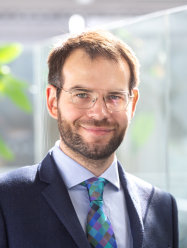
Fibre optics pioneer Charles Kao's global journey is highlighted by President Gast

Science needs "pragmatic ideas to foster mobility", writes Professor Alice Gast in Physics Today.
In a commentary for the world’s most influential physics magazine, Imperial’s President reflected on the political shocks of 2016 and how physicists and the wider academic community can respond.
“In this period of populist retreat from globalization, we need to promote the benefits of freedom of movement.”
– Professor Alice Gast
Physics Today
Professor Gast said: “As an American in London and president of one of the world’s great universities, I woke up early to the European Union referendum result that Friday morning in June and paused for thought. I reflected deeply about the value of international collaboration and mobility, and I realized Brexit was not the only concern. The rhetoric in the US presidential campaign was also isolationist... We have run hot and cold on immigration in the US, and I have been dismayed at the experiences many highly accomplished scientists have had at the nation’s borders.”
She added: “we must consider the political realities of wide swathes of people who feel that globalization has left them behind and that international mobility harms them. Even so, we need to make the case for scientists—and physicists in particular—to move freely across borders and around the planet.”

Fibre-optics pioneer and Nobel laureate Charles Kao’s journey shows us why, said President Gast. He “was born in Shanghai, China, moved to Hong Kong, and studied in Greenwich and London in the UK. He then went back to Hong Kong, moved to the US, spent a year in Germany, returned to Hong Kong as vice chancellor of the Chinese University of Hong Kong, and then took a sabbatical at my institution, Imperial College London. He now lives in California. One can only imagine the visas he has held and the paperwork he has had to fill out.”
Global citizens
President Gast wrote: “Physicists get around; they are global citizens. Scientists and engineers from 120 countries collaborate at CERN, where solving challenging problems transcends political differences and the science requires collaboration on a global scale. It becomes irrelevant where they were born or what passport they hold. Like Doctors Without Borders (Médecins Sans Frontières), who help patients regardless of politics or nation, scientists without borders work together because they are motivated by challenges they often could not solve alone.
“Can we envision a utopian future with international passports or global green cards for our best and brightest scientists? That may be a step too far in an era of backlash against globalization, but we can at least look at some pragmatic ideas to foster mobility."
These include encouraging student mobility both into and out of countries, cultivating entrepreneurship and policies that enable scientists to move about. "A conference here, a sabbatical there, a two-week holiday hiking in the mountains, all are ingredients in the recipe for insight, discovery, invention, and creativity," she added.
Professor Gast concluded: "In this period of populist retreat from globalization, we need to more broadly promote the benefits of freedom of movement. If we can do that, any town may soon be lucky enough to boast of a physicist or startup tech company."
The full commentary can be read online and in the January issue of Physics Today.
Main photo credit: x_tine.
Article text (excluding photos or graphics) available under an Attribution-NonCommercial-ShareAlike Creative Commons license.
Photos and graphics subject to third party copyright used with permission or © Imperial College London.
Reporter

Andrew Scheuber
Communications Division

Contact details
Email: press.office@imperial.ac.uk
Show all stories by this author




Leave a comment
Your comment may be published, displaying your name as you provide it, unless you request otherwise. Your contact details will never be published.